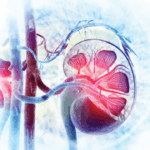
From poor focus to night sweats, our hormones are often blamed.
It’s true that hormonal imbalances can wreak havoc on our energy, mood, and sleep, but it doesn’t have to be that way. Our endocrine glands produce, store, and release hormones, and travel through the body to bring important messages to our cells. However, hormones and endocrine glands do not work in isolation. Important connections in the endocrine system are vital to managing its functions for supporting growth and development, managing stress and sleep, and balancing blood sugar and metabolism. One such valuable connection is the ovarian-adrenal-thyroid (OAT) axis.
The OAT Axis
Michael Lam, MD, was the first to coin the term OAT axis and describe how the ovaries, adrenal glands, and thyroid gland influence one another. Dr. Lam describes the OAT axis best as follows:
All three organs of this axis must be in a state of optimum balance for a woman to feel good. Like a three-legged stool, all three legs must be in perfect balance for the stool to be safe to sit on. Imbalance of the OAT axis leads to a myriad of conditions that are annoying in their mildest form and incapacitating when hormonal imbalance symptoms are severe.
Therefore, if a woman is experiencing thyroid dysfunction, there may be concurrent disturbances with the adrenal glands and ovaries. Likewise, ovarian hormonal imbalances, such as estrogen dominance, can impact thyroid health and adrenal function. How can we keep these three endocrine glands healthy to prevent hormonal imbalances? Let’s investigate each part of the OAT axis, its functions, and how each gland can be kept in a state of balance.
The Ovaries
The ovaries are an important part of the female reproductive system responsible for various functions, including producing hormones such as estrogen and progesterone. Among its many roles, estrogen is involved in ovulation, bone metabolism, cardiovascular health, and brain function. Unfortunately, our estrogen balance is being disrupted. Pesticide-laden food, gut dysbiosis, certain medications, and xenoestrogen exposure are influencing estrogen production and metabolism, causing concerns about estrogen dominance. High estrogen can affect adrenal and thyroid health, leading to mood swings, hair loss, slow metabolism, foggy thinking, and conditions such as PCOS, endometriosis, adrenal fatigue, and hypothyroidism.
Address estrogen dominance with these simple steps:
- Choose clean personal care and household cleaning products, and minimize the use of plastics
- Increase your consumption of liver-supporting foods and herbs (beets, dandelion, milk thistle)
- Support estrogen metabolism with indole-3-carbinol
- Consume fiber and probiotics for gut health
The Adrenal Glands
We’ve all experienced stress, but did you know your adrenal glands are part of your body’s stress response? When stress occurs, the hypothalamus-pituitary-adrenal (HPA) axis is activated: the hypothalamus and pituitary glands send signals to the adrenal glands to release hormones such as cortisol to protect the body. Increased heart rate, breathing, and blood pressure are part of the initial stress response; however, continued stress exposure can cause malfunctions in the HPA axis and set the stage for adrenal fatigue syndrome. Fatigue, anxiety, brain fog, cravings, disrupted sleep, insulin resistance, obesity, and inflammation can occur. As expected, ovarian and thyroid health are impacted, resulting in estrogen dominance, infertility, irregular menstrual cycles, and hypothyroidism.
Although we cannot always avoid stress, we can support our adrenal glands by:
- Consuming a whole food diet with ample protein, healthy fats, and fruits and vegetables
- Engaging in relaxation exercises and non-strenuous physical activity
- Following a consistent sleep routine for a good night’s rest
- Supplementing with key adrenal support nutrients (vitamins C and B5, magnesium) and herbal adaptogens (ashwagandha, rhodiola, maca)
The Thyroid Gland
Often described as the body’s gas pedal, the thyroid gland is a butterfly-shaped endocrine gland that releases hormones, such as T4 (thyroxine) and T3 (triiodothyronine). The thyroid controls metabolism and regulates vital body functions, including breathing, heart rate, weight, menstrual cycles, and body temperature. Age, family history, autoimmune disease, environmental toxins, estrogen dominance, and adrenal fatigue can lead to hypothyroidism with symptoms such as low energy, weight gain, cold intolerance, hair loss, and constipation.
When looking to support the thyroid gland, it’s important to:
- Ensure adequate intake of thyroid-supporting nutrients (iron, selenium, vitamin D)
- Consume healthy fats
- Eat raw goitrogenic foods in moderation (broccoli, kale, cabbage, cauliflower)
- Avoid thyroid-disrupting chemicals (PCBs, phthalates, toxic metals)
Work with your health care practitioner to evaluate and solve any ovarian, adrenal, and/or thyroid concerns, and you will be on the path to optimum hormone balance.












